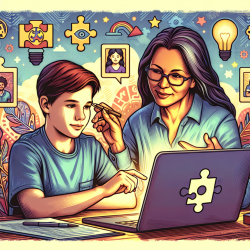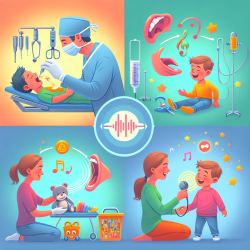As the field of online therapy continues to grow, particularly in the realm of special education, understanding the nuances of nonverbal communication becomes increasingly important. A pivotal study by Ross Buck and Jay Lerman, titled General vs. Specific Nonverbal Sensitivity and Clinical Training, sheds light on the significance of nonverbal sensitivity in clinical settings. This research provides valuable insights for practitioners seeking to enhance their therapeutic skills, especially in an online environment where traditional cues might be less observable.
The study differentiates between two types of nonverbal sensitivity: general and specific. General nonverbal sensitivity refers to the ability to understand the nonverbal cues of individuals with whom one does not have a personal relationship, while specific nonverbal sensitivity relates to decoding cues from those with whom one has a direct connection. Interestingly, the research found no significant difference in general nonverbal sensitivity between undergraduate and graduate clinicians. However, it highlighted that graduate clinicians exhibited superior specific nonverbal sensitivity towards their own clients compared to undergraduates.
This distinction is crucial for online therapy practitioners, especially those working in special education. Developing a deep understanding of specific nonverbal sensitivity can significantly enhance the therapeutic relationship and outcomes. Here are several strategies derived from the study's findings that can help practitioners improve their nonverbal communication skills:
- Invest in Training: Continuous professional development in nonverbal communication can enhance a clinician's ability to connect with clients on a deeper level, fostering a more supportive and understanding therapy environment.
- Practice Mindful Observation: Paying close attention to the subtle nonverbal cues of clients, such as facial expressions, gestures, and tone of voice, can provide insights into their emotional state and needs.
- Use Technology to Your Advantage: Leveraging high-quality video conferencing tools can help in capturing nonverbal cues more effectively during online sessions.
- Seek Feedback: Regularly soliciting feedback from clients about their experience can offer valuable insights into how well you are interpreting and responding to their nonverbal communication.
- Reflect on Personal Bias: Being aware of and reflecting on one's own biases and how they might affect the interpretation of nonverbal cues is critical for accurate understanding.
Implementing these strategies can not only improve a clinician's nonverbal sensitivity but also the overall effectiveness of therapy sessions. For those in the field of online therapy, especially within special education, recognizing the importance of nonverbal communication is key to building stronger, more empathetic connections with clients.
Enhancing one's nonverbal communication skills is a journey of continuous learning and adaptation. As online therapy evolves, so too must our approaches to understanding and engaging with clients beyond words. By focusing on the nuances of nonverbal sensitivity, therapists can create more meaningful and impactful therapeutic experiences.
For those interested in delving deeper into the research and its implications for clinical practice, reading the original study can provide further insights. To read the original research paper, please follow this link: General vs. Specific Nonverbal Sensitivity and Clinical Training.










